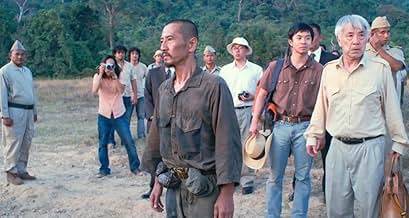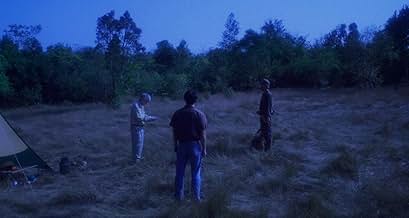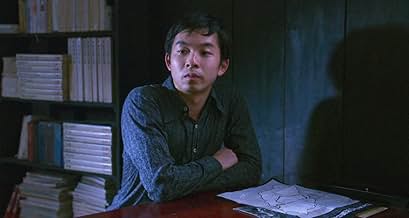IMDb RATING
7.2/10
3.3K
YOUR RATING
When Japan surrenders at the end of World War II, soldier Hiroo Onoda retreats into the jungles of the Philippines to continue the war himself for another 10,000 days.When Japan surrenders at the end of World War II, soldier Hiroo Onoda retreats into the jungles of the Philippines to continue the war himself for another 10,000 days.When Japan surrenders at the end of World War II, soldier Hiroo Onoda retreats into the jungles of the Philippines to continue the war himself for another 10,000 days.
- Director
- Writers
- Stars
- Awards
- 5 wins & 20 nominations total
Yûya Endô
- Hiroo Onoda - Young
- (as Endô Yûya)
Kanji Tsuda
- Hiroo Onoda - Old
- (as Tsuda Kanji)
Yûya Matsuura
- Kinshichi Kozuka - Young
- (as Matsuura Yûya)
Tetsuya Chiba
- Kinshichi Kozuka - Old
- (as Chiba Tetsuya)
Shinsuke Kato
- Shôichi Shimada
- (as Katô Shinsuke)
Kai Inowaki
- Yûichi Akatsu
- (as Inowaki Kai)
Issei Ogata
- Major Yoshimi Taniguchi
- (as Issey Ogata)
Taiga Nakano
- Norio Suzuki - The Tourist
- (as Nakano Taïga)
Nobuhiro Suwa
- Tanejirô Onoda - Onoda's Father
- (as Suwa Nobuhiro)
Mutsuo Yoshioka
- Captain Hayakawa
- (as Yoshioka Mutsuo)
Tomomitsu Adachi
- Governor-General Shigenori Kuroda
- (as Adachi Tomomitsu)
Kyûsaku Shimada
- Lieutenant Suehiro
- (as Shimada Kyûsaku)
Jemuel Satumba
- Filipino Prisoner
- (as Jemuel Cedrick Satumba)
Ryû Morioka
- Student
- (as Ryu Morioka)
Akira Morita
- Extra
- (as Morita Akira)
- Director
- Writers
- All cast & crew
- Production, box office & more at IMDbPro
Featured reviews
In anticipation of the Allied landings on the Philippine island of Lubang, the Japanese send a small squad to engage in some guerrilla warfare activities pending the reorganisation of their own troops ready to return in due course. Amongst these men is the young Lt. Hiroo Onoda. He is an idealistic young man who firmly believes in his cause and is determined to do what he can, for as long as he can. Now what we know from the outset is that his nation surrenders in 1945, one year after these troops are deployed - but nobody tells Onoda. With his small squad still patrolling the island, their team begins to fracture. Their discipline to fail. The relentless monsoon rains; disease and the activities of the locals begin to reduce their number but he is adamant that he will stay on duty for as long as it takes - even if that takes us into the 1970s. Both Yûya Endô as the younger man and Kanji Tsuda as the older one play their parts convincingly as the story, based on real facts, illustrates the tough life amidst the dense jungle where they are seemingly abandoned by their own side and left to their own, limited, devices. The story mixes the timelines so we skip from young to older, and that's quite effective at breaking up the story to avoid it being just a straightforward chronology. It also uses the other characterisations to demonstrate the increasing frustrations of these men as personalities clashed and loyalties, and authority, is tested. As we proceed their's becomes more of a brotherhood than an army unit, and that makes the tragedies and misfortunes that befall them all the more poignant. It's history, so there isn't much latitude as to the denouement, but when we do get there it's quite a touching conclusion that seems just a bit rushed, but entirely fitting.
The case of Onoda, a WW2 Japanese soldier who carried on fighting for thirty years on the Philippine island of Lubang before being persuaded to give up, was a celebrated case in the mid 1970s, and I was really impressed by this dramatic reconstruction of his life. It's a high quality movie, beautifully filmed, thoughtful, and well played all round, though I also thought it a bit too long at more than 2.5 hours. There are great performances all round and solid direction which almost has a David Lean approach at times (no bad thing), so it's a 'small scale epic' with a heart, and well worth a view. There are some supremely effective moments, and the film deserves a wider audience, though you do have spare quite a bit of time.
Greetings again from the darkness. There has been no shortage of conspiracy theories, either recently or historically, that have left non-believers bewildered at how 'the other side' held firm. Writer-director Arthur Harari and his co-writers Bernard Cendron and Vincent Poymiro bring the remarkable struggle of Hiroo Onoda to the screen. Onoda was a Japanese soldier who refused to believe WWII ended, and instead, continued his mission of resistance by spending thirty years in a Filipino jungle.
Onoda was only 22 when he entered the war in 1944. He is played as a young man by Yuya Endo, and in later years by Kanji Tsuda. The film goes mostly in chronological order, with only occasional flashbacks to Onoda's "special training" by Taniguchi (Issey Ogata), his trainer and trainer. The passing of years is noted on screen, and we watch as Onoda's squadron shrinks in size, holding at four for quite a while, before shifting to two, and finally only he remains. During the special training, Taniguchi declares, "You don't have the right to die", instilling a firm commitment to the cause in Onoda.
Also seared into Onoda's brain is the proclamation of, "We'll come back for you. No matter how long it takes, we'll come back for you." Still, it's fascinating to see his determination to keep fighting, despite so many signs that the war was over. He viewed magazine articles and radio broadcasts as tricks to draw him away from his mission ... going so far to decipher a coded message that was anything but that.
The young man who finally succeeds in lulling Onoda out of the jungle has his own mission - actually three of them: finding a panda, locating Onoda (by this time a legend), and tracking down a Yeti. It's a bittersweet moment for the long-dedicated soldier, and he went on to live many more years as a home country icon - considered a nationalist man of honor by some, a murdering fool by others. The film, and Onoda's saga, makes us question the point of war when it's impossible to tell if the war is over or ongoing. Harari's film is almost three hours, which is entirely too long ... but significantly shorter than the time Onoda spent in the jungle.
Releasing in theaters on October 14, 2022.
Onoda was only 22 when he entered the war in 1944. He is played as a young man by Yuya Endo, and in later years by Kanji Tsuda. The film goes mostly in chronological order, with only occasional flashbacks to Onoda's "special training" by Taniguchi (Issey Ogata), his trainer and trainer. The passing of years is noted on screen, and we watch as Onoda's squadron shrinks in size, holding at four for quite a while, before shifting to two, and finally only he remains. During the special training, Taniguchi declares, "You don't have the right to die", instilling a firm commitment to the cause in Onoda.
Also seared into Onoda's brain is the proclamation of, "We'll come back for you. No matter how long it takes, we'll come back for you." Still, it's fascinating to see his determination to keep fighting, despite so many signs that the war was over. He viewed magazine articles and radio broadcasts as tricks to draw him away from his mission ... going so far to decipher a coded message that was anything but that.
The young man who finally succeeds in lulling Onoda out of the jungle has his own mission - actually three of them: finding a panda, locating Onoda (by this time a legend), and tracking down a Yeti. It's a bittersweet moment for the long-dedicated soldier, and he went on to live many more years as a home country icon - considered a nationalist man of honor by some, a murdering fool by others. The film, and Onoda's saga, makes us question the point of war when it's impossible to tell if the war is over or ongoing. Harari's film is almost three hours, which is entirely too long ... but significantly shorter than the time Onoda spent in the jungle.
Releasing in theaters on October 14, 2022.
This is really an outstanding movie which is not a "war movie" but rather a complex psychological one of what drive us as a person to take a stand when confronted to situations we could not have ever imagined. Of course education, training, the society, family history, the culture of the country in which you were born, all of this will play a major role with regard to the choice(s) that we will take in life. However, as per prior personal experiences and call it maybe "the genetics" these choices will be different for people even having the same cultural background. The life story of lieutenant Onoda is maybe what you could call an "extreme" one which, besides cultural background, was certainly facilitated by his "physical adaptation" allowing him to endure the certain hardships and harrowing experiences he encountered during his many years of isolation.
Onoda is a long movie but its length was necessary not to develop the psychological development of the main character but rather to allow the viewer to "feel" what it must have meant in terms of hardship, endurance and faith the choices that Lieutenant Onoda took to honor his pledge of obedience regardless the validity of the cause he chose to defend.
The fact the movie Onoda was released in full pandemic, of the relatively unknown nature of the real history of lieutenant Onoda and that the film must only be shown in the Japanese language (with subtitles) as an indispensable component of the story will certainly limit its diffusion in theaters. Still this will not hamper the fact that this is cinema of the highest caliber and that Arthur Harari, its French director succeeded in making an admirable movie not to be missed!
Onoda is a long movie but its length was necessary not to develop the psychological development of the main character but rather to allow the viewer to "feel" what it must have meant in terms of hardship, endurance and faith the choices that Lieutenant Onoda took to honor his pledge of obedience regardless the validity of the cause he chose to defend.
The fact the movie Onoda was released in full pandemic, of the relatively unknown nature of the real history of lieutenant Onoda and that the film must only be shown in the Japanese language (with subtitles) as an indispensable component of the story will certainly limit its diffusion in theaters. Still this will not hamper the fact that this is cinema of the highest caliber and that Arthur Harari, its French director succeeded in making an admirable movie not to be missed!
The movie's really good. The beginning kinda drags on, despite you perfectly understanding the stakes, but it pays out in the end.
The characters are lovable, the story's not far from what really happened. The picture's great, although slightly blurry sometimes.
Really worth it.
The characters are lovable, the story's not far from what really happened. The picture's great, although slightly blurry sometimes.
Really worth it.
Did you know
- TriviaWhilst set on a remote Philippines Island the film was in fact shot on location in the kingdom country of Cambodia.
- How long is Onoda: 10,000 Nights in the Jungle?Powered by Alexa
Details
- Release date
- Countries of origin
- Official sites
- Languages
- Also known as
- Onoda: 10,000 Nights in the Jungle
- Filming locations
- Bokor National Forest, Cambodia(jungle)
- Production companies
- See more company credits at IMDbPro
Box office
- Budget
- €4,530,000 (estimated)
- Gross worldwide
- $262,276
- Runtime2 hours 53 minutes
- Color
- Aspect ratio
- 1.85 : 1
Contribute to this page
Suggest an edit or add missing content
































